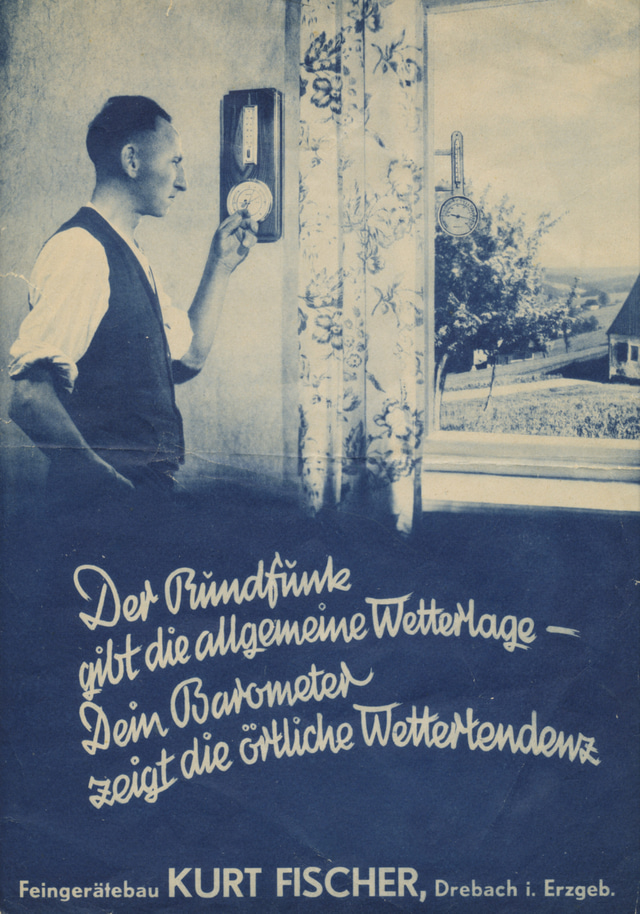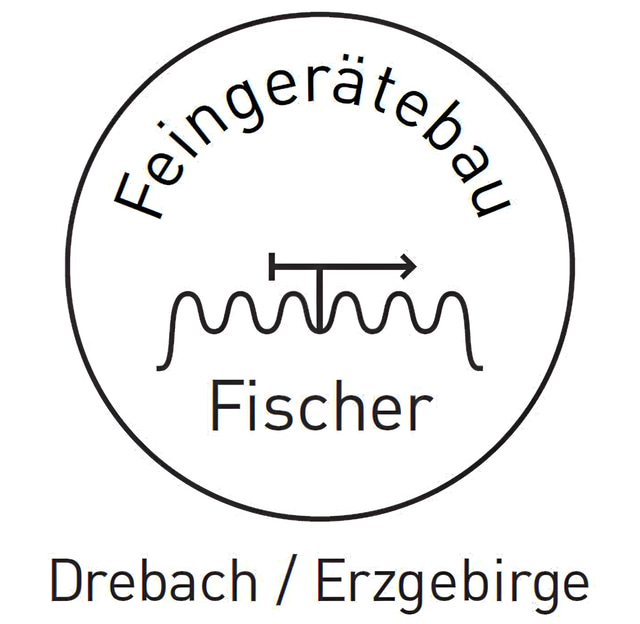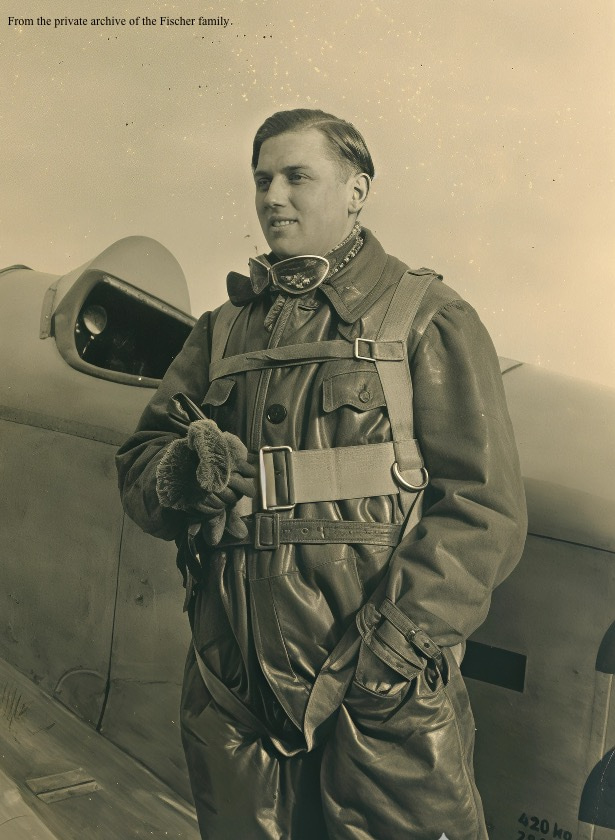


More photographs of Kurt Fischer can be seen here.
Founding and Early Years (1945–1950s)
The company FISCHER was founded in 1945 by Kurt Fischer in the village of Drebach, located in the Ore Mountains (Saxony). From 1928 to 1933, Kurt studied in Berlin and became an aircraft engineer. In 1934 and 1935, he worked as a test engineer and head of flight testing at the German Aviation Research Institute in Berlin—the cradle of German aviation. Kurt’s greatest passion was aviation, and he remained devoted to it throughout his life. He was also an active pilot, but during one of the test flights an accident occurred, after which he never flew again.
In 1936, Kurt Fischer was invited to Hamburg to organize the production of aviation instruments as Technical Director of the company Emil Scholz, which was rapidly expanding at the time. In his memoirs, Kurt wrote that the firm employed more than 600 people.
In 1941, a subsidiary—Schimmelpfeng Gerätebau—was established in the village of Drebach in the Ore Mountains, but in 1945 it was dismantled by the Soviet army. After the destruction of Hamburg, which suffered massive Allied air raids, Kurt Fischer also moved with his family to Drebach. Since 1945, the FISCHER company has been based in this village, not far from the Czech border. Kurt and his wife initially planned to return to Hamburg, but in the end they decided to remain in the Ore Mountains. In his wife’s diary, there is an entry from August 1945: “The Russians won’t allow Kurt to keep any machines… Now he has to start all over again.” And that is exactly what he did: in October 1945, he founded his own workshop, which in 2025 will celebrate its 80th anniversary.
By 1946, the first barometers had already been produced in the workshop, soon followed by other meteorological instruments—all of them distinguished by their robust construction and high-quality craftsmanship. These products laid the foundation for the company’s reputation as a manufacturer of reliable weather and climate measuring instruments.
In the early post-war years, the enterprise remained a private workshop owned by Kurt Fischer. However, as production and demand for the instruments grew, so did the need for expansion. In 1958, with the involvement of GDR state authorities, the company was reorganized into Feingerätebau Kurt Fischer KG—a limited partnership with state participation. This period marked significant growth: the firm carried out extensive scientific and design work for aviation, including the production of microbarographs for monitoring pressure during aircraft landings and altigraphs (Höhenschreiber) for avionics. These specialized and relatively rare instruments strengthened the company’s position in the niche of precision aerometeorological devices.
Development in the 1960s
In the 1960s, the Fischer family continued to contribute to innovation. The founder’s son, Bernd Fischer, took the lead in 1963, spearheading intensive research in hygrometry (humidity measurement). The result of this work was the refinement of Fischer’s hair hygrometers, achieving impeccable accuracy that earned the FISCHER brand an outstanding reputation in this field. The reputation of Fischer’s precision hygrometers endures to this day.
One of the company’s key achievements during this period was the invention of an improved aneroid barometer. In 1965, the firm patented a unique six-part aneroid barometer mechanism of its own design. This mechanism, consisting of six interconnected aneroid capsules, provided exceptional accuracy in measuring atmospheric pressure. In 1967, this design received an award from the German Office for Metrology and Product Testing of the GDR (Deutsches Amt für Messwesen und Warenprüfung) for its technical excellence. By the end of the 1960s, “K. Fischer” had gained recognition not only in the marketplace but also within the GDR’s scientific and technical community.
Nationalization in the GDR (1972–1989)
In 1972, as part of the widespread nationalization of industry in the GDR, Kurt Fischer’s enterprise was forcibly expropriated and transformed into a state-owned entity. The company was renamed VEB Feingerätebau Drebach (People’s Enterprise “Precision Instrument Manufacturing Drebach”). Despite the change in ownership, the production of high-precision barometers, hygrometers, and other meteorological instruments continued at the same location. Moreover, the well-known FISCHER brand endured: the state enterprise retained the “Fischer” trademark due to its international recognition and demand abroad. Products from Drebach were exported to other countries, and the brand remained prominent in catalogs and exhibitions. This was a rare instance where the founder’s name survived nationalization—a testament to the strong reputation Fischer instruments had earned beyond the GDR by the early 1970s.
During the VEB period (1970s–1980s), as part of the socialist economy, the enterprise participated in industry exhibitions (likely including the Leipzig Trade Fair) and supplied instruments for both the domestic market and export to other socialist bloc countries and the West. Precision barometers and hygrometers from Drebach found applications in meteorological services and industry. After 1972, Kurt Fischer no longer formally owned the company; nevertheless, his innovations continued to be utilized, and family traditions were upheld—many employees, including family members, remained with the enterprise, passing down expertise to the next generations.
Modern History After 1990
Following German reunification in 1990, the Drebach enterprise was reprivatized and returned to the Fischer family. The company adopted its current legal name, Feingerätebau K. Fischer GmbH, and regained its status as a private family business. The return of the company to the founder’s family enabled it to blend its rich heritage with a market economy. Leadership passed to a new generation of the Fischer family. In particular, Peter Fischer, a third-generation representative, joined the management (focusing on sales development), continuing the family legacy. He noted that every family member contributed to the firm’s success: his father, Bernd, established the precision of hygrometers in the 1960s, while Peter, with his education, joined the company to expand its market reach.
In 1997, the firm modernized its production facilities—a new, state-of-the-art manufacturing building was constructed in Drebach to enhance efficiency and assembly quality. This allowed the company to maintain local production in Saxony while increasing output volumes.
The company continued to grow and forge partnerships. A landmark event was its collaboration with another renowned instrument manufacturer, G. Lufft. In 2012, Feingerätebau K. Fischer GmbH took over the production of Lufft’s mechanical measuring instruments. Essentially, the Drebach company assumed responsibility for manufacturing Lufft’s classic analog products (barometers, hygrometers, etc.) as Lufft shifted its focus to electronic meteorological equipment. This move expanded Fischer’s product range and united two longstanding traditions of instrument-making (Fischer and Lufft) under one roof.
In 2015, Feingerätebau K. Fischer GmbH joined the industrial group ProInn Beteiligungen GmbH. Integration into a larger corporate group provided additional investment and business stability, creating opportunities for further expansion of measuring instrument production. Nevertheless, the FISCHER brand and the Drebach factory retained their distinct identity. As part of ProInn, the company continues to produce goods under its historic trademark and uphold its tradition of quality.
Today, Feingerätebau K. Fischer GmbH is an active enterprise with an 80-year history. Still based in Drebach, it specializes in crafting high-quality analog meteorological instruments. Its products are sold worldwide, and the Fischer brand is synonymous with German quality and handcrafted assembly. Thus, the company has successfully evolved from a small post-war workshop into a modern manufacturer, maintaining generational continuity and its reputation across decades.